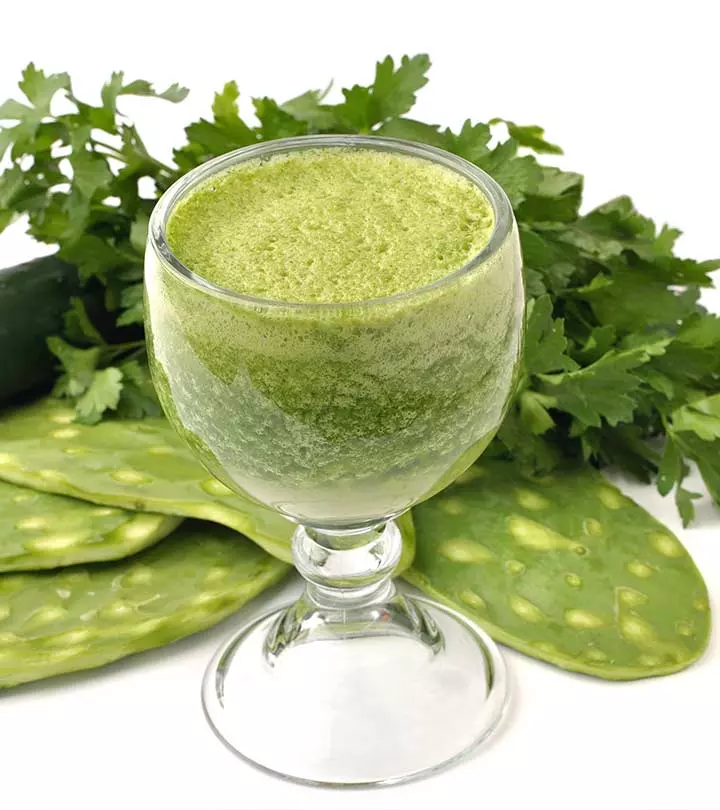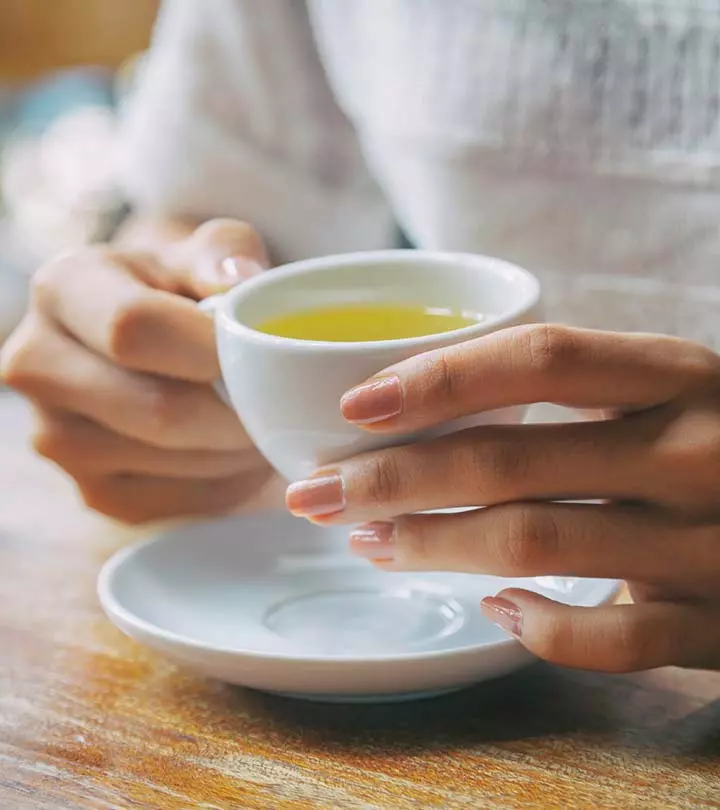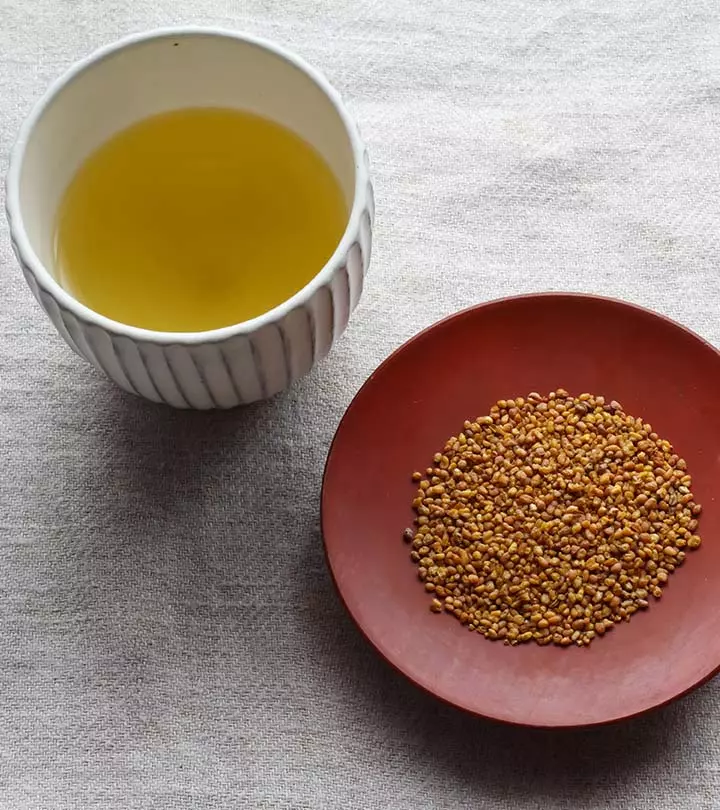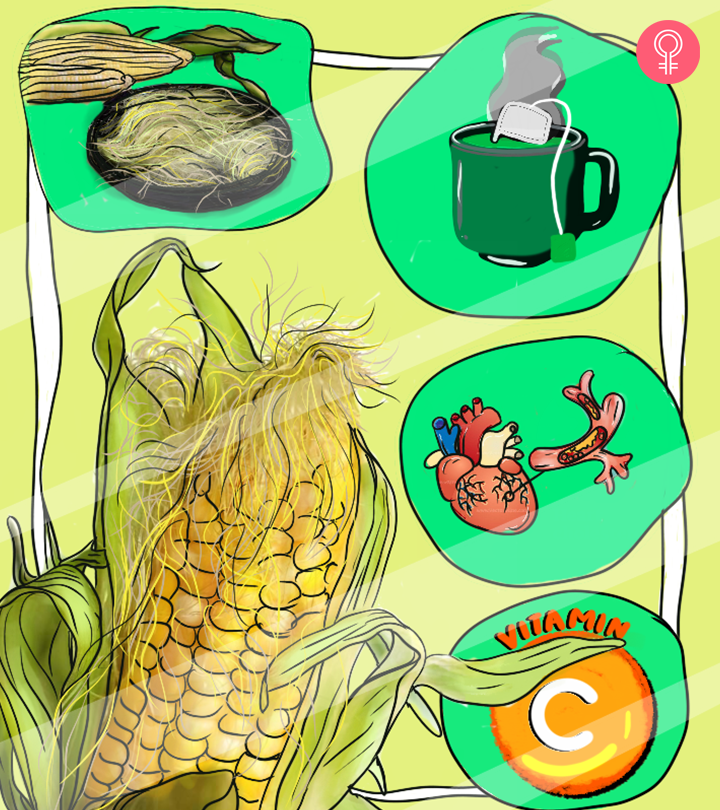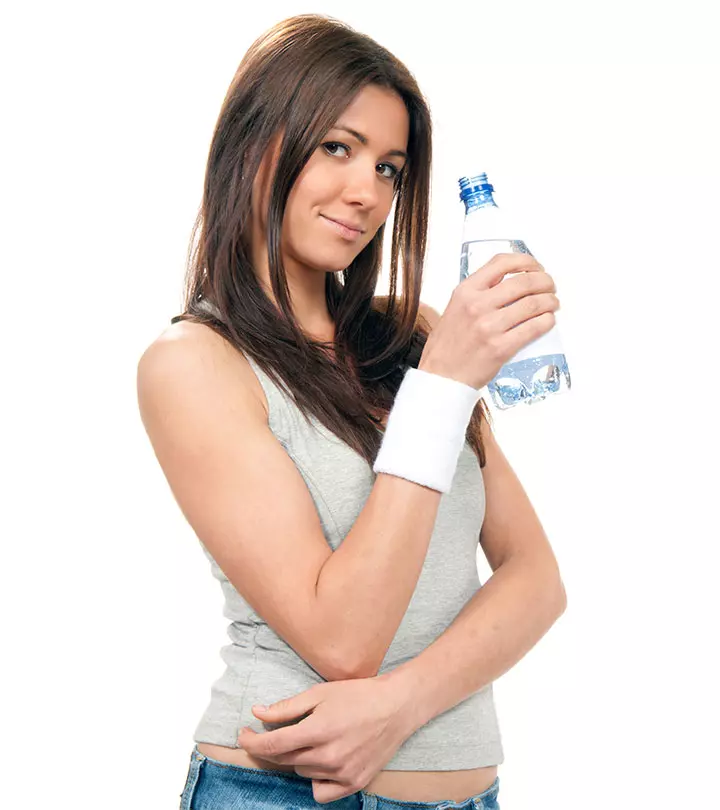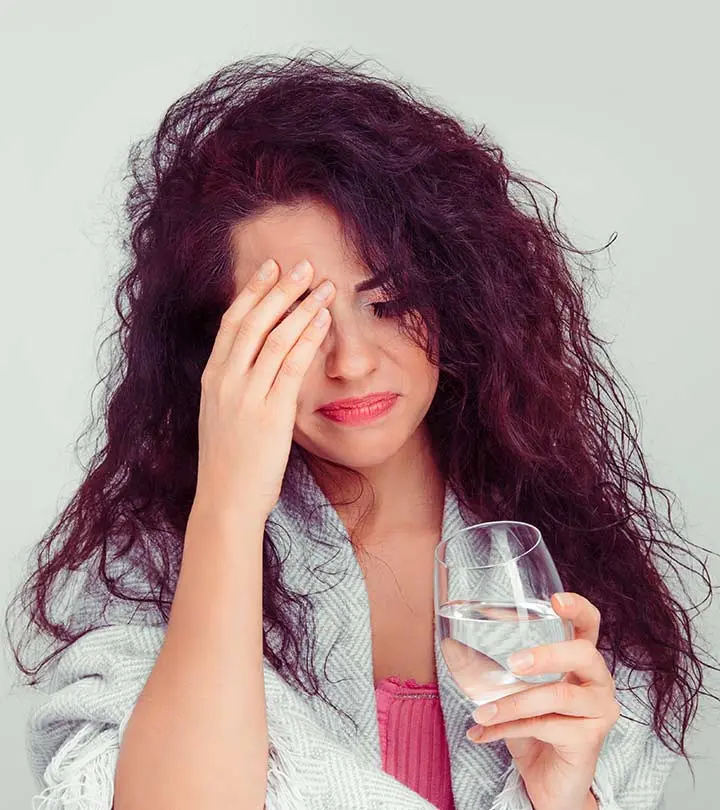10 AmazingHealth Benefits Of Drinking Adequate Water
The highly underrated beverage can do some incredibly good things for your body.
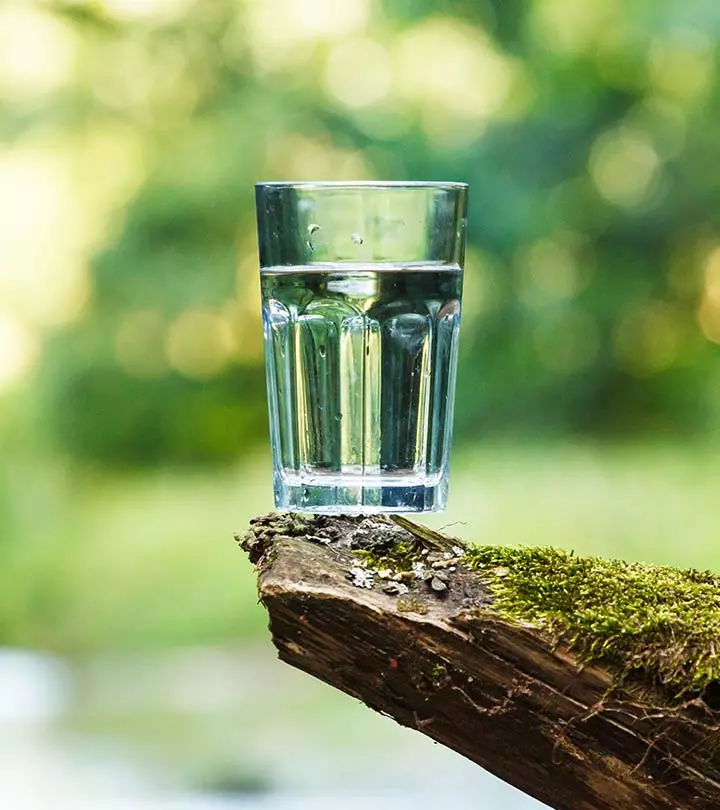
Water plays a major role in the normal functioning of the human body (1). It almost makes up 60-70% of the body. There are many benefits of drinking water and it can improve your overall health. As per the World Health Organization, having regular access to drinking water that is safe is a human right(2).
People who eat a balanced diet and are more physically active drink more water than others (3). Dehydration may trigger many health ailments. For instance, in the elderly, dehydration is linked to an increased mortality rate (4). Hence, maintaining normal hydration levels is key to maintaining overall health and avoiding health ailments.
This article discusses the benefits of adequate hydration, recommended water intake, and the negative effects of excess water intake. Read on.
In This Article
10 Health Benefits Of Water
1. Is A Major Component Of The Body
Water is the major cellular component (1). It helps maintain the composition of saliva, blood, and cerebrospinal fluids. The saliva hydrates our mouth, helps in digestion, and flushes out the toxins and bacteria (1). Our blood carries oxygen and nutrients to all parts of our body.
Water is essential for the absorption of nutrients and the removal of harmful substances. All the enzymatic reactions in our body take place in this fluid environment.
Water lubricates the various joints and cartilages in our skeletal system. It makes up 80% of our lymphatic system and helps ward off infections (5).
2. May Help In Regulating Body Temperature
Water is vital in regulating the body temperature. The body has to cope with varying temperatures and other external factors in different environments.
The body temperature tends to shoot up in hot climates and during strenuous physical activity (6). The body helps bring down the core temperature by sweating (7). This is essential as our body needs to operate at optimum temperatures for various physiological functions.
3. May Help In Preventing Chronic Disorders
Regular intake of water can reduce the risk of cardiovascular disease, urinary tract infections, and brain strokes (1). Lower intake of water increases the production of an enzyme (SGK1) linked to chronic disease. It may increase the risk of thrombosis, cardiac fibrosis, hypertension, and stroke (8).
Adequate water intake may be helpful in reducing sugar levels in people with ketoacidosis during diabetes (9).
The evidence for daily water intake on the prevention of bladder or colon cancer is inconclusive (9). Most chronic disorders involve multiple organs. We need more research to understand the mechanism of water in preventing chronic disease.
4. May Help In Regulating Blood Pressure And Improve Cardiovascular Health
Water makes up 90% of the blood volume that is directly correlated to blood pressure. Excess water may dilute the blood and lower blood pressure. Water deficit may make blood thicker and increase blood pressure (10).
Either of the cases are harmful for the body. Research has linked continuous low water consumption to an increased future risk of cardiovascular ailments (8).
Higher intake of fluids from foods and beverages was associated with a reduced risk of cardiovascular mortality in both sexes. It also reduced the risk of ischemic stroke in women in Japan (11).
5. May Help Prevent Constipation
Water helps in digestion and bowel movement. Lack of water can lead to constipation (12). Though there are other causes of constipation, inadequate water intake seems to be an important factor.
Loss of water during diarrhea (sodium loss) also leads to an imbalance in the digestive tract (13). Water, electrolytes, and even the good bacteria are flushed out, resulting in dehydration and fatigue. Losing too much water can be fatal (13).
Lack of sufficient water in the system may lead to ulcers in the stomach. However, there is no evidence to back this claim.
6. May Boost Performance During Exercise
Water is lost during extreme physical activities (6). Consuming more water is found to be beneficial, especially for athletes. Low water intake or sub-optimal states of hydration may affect the performance levels of athletes.
The rigorous physical demands of athletes lead to excessive loss of water via sweating (14). This could be replenished by drinking water along with important electrolytes (15). Drinking water may also help improve the overall immunity of the body.
7. May Help In Improving Brain Function
Water is an integral component of the cerebrospinal fluid. It also forms the basic constituent of neurotransmitters and hormones. Sensations of thirst are regulated by the hormones in the brain (16). Water also could protect the brain from physical damage.
Lack of water, over long periods, can lead to a decline in cognitive functions. Some such symptoms may include increased tiredness and reduced alertness (17). However, the literature on the effects of dehydration on brain function are inconsistent (18).
8. May Prevent Headaches
Dehydration is one of the causes of headaches (19). Taking water may reduce headaches and even help the body function properly (20).
Water could be of additional help when one has consumed an excess of alcohol or sweetened beverages (these drinks could reduce the water content of the body and lead to dehydration headaches).
9. May Aid Weight Loss
Drinking water regularly and consuming foods high in water content can help in keeping the body satiated for long periods. Sometimes, we confuse thirst for hunger and tend to eat. Drinking water reduces cravings for food. It also discourages binge eating. This may help lower your calorie intake.
Drinking water increases the metabolic rate of the body (21).This thermogenic effect may lead to weight loss, according to a study published in the Journal of Clinical Endocrinology (22).
10. May Promote Kidney Health
Adequate water intake is important for the kidneys to function properly. Water also helps in lowering the risk of urinary tract infections (UTIs) (23). UTIs can be life-threatening if proper medical assistance is not provided.
Lack of sufficient water can also lead to kidney stones and bladder infections. It also may increase the risk of developing chronic kidney disease (24). However, research is inconsistent, and more studies are warranted.
Another study showed that drinking adequate water/fluids can help in reducing the risk of bladder cancer in men (25).
Severe prolonged dehydration due to water or electrolyte imbalance can lead to loss of consciousness, speech impairment, hypotension, extreme fatigue, involuntary muscle movements, and tachycardia (increased heart rate) (26).
In addition to these benefits, water has two other major advantages. It can help improve skin and hair health.
Benefits Of Drinking Water For The Skin
The skin is the largest organ in the body. Water constitutes most of its cellular structure. Adequate hydration is important for optimal skin health. Drinking water helps in flushing out toxins from the cells.
All the enzymes and components in the skin, such as hyaluronic acid and collagen, need a fluid-like environment to function (27). Hyaluronic acid and collagen (along with certain alpha-hydroxy acids) give plumpness and elasticity to the skin (28). Dehydrated skin looks wrinkly, saggy, and leathery.
The skin feels tight and dry when its cells lose water. Extreme hot or extreme cold temperatures can cause this.
Collagen and antioxidants are involved in preventing premature aging. They also slow down the appearance of fine lines or wrinkles. Aged skin tends to have low collagen levels (29).
Skin rejuvenation happens when the hydration status is optimum. In fact, mineral water supplementation was found to improve skin hydration (30). The oil production in skin is disturbed when the skin is dehydrated. Sometimes, this may lead to excess oil production and acne.
Drinking water and moisturizing the skin properly can help improve skin physiology (31). The skin has a barrier that works best when it is hydrated. Broken skin barriers cannot protect from sun damage. Dehydrated skin may also increase the risk of rashes or eczema.
There is no clear agreement on the amount of water to consume for healthy skin. Drinking 8 glasses of water was popularized for good skin and health. But there is no scientific basis for this claim.
Benefits Of Drinking Water For Hair
Water helps in absorbing essential nutrients. This may help nourish the hair and scalp. Dehydration can dry the hair shaft and may lead to split ends and hair breakage.
Water also helps in removing toxins from the hair scalp through sweat. Water is essential for shiny and healthy hair. Sufficient quantity of water can help in hair growth (32).
Adequate moisture in hair can help in reducing frizz and tangling. Extreme dehydration can lead to dry and brittle hair. There is inconclusive data available on how much water is necessary for healthy hair.
How Much Water Should You Drink?
There is no clear consensus on the ideal amount of water intake for humans. The dose depends on the sex, age, and health status of the individual.
Physical activity and body weight also play an important role in calculating optimum water intake. Women who are pregnant or lactating have different water requirements (33), (34).
However, the water and mineral content in our body is meticulously regulated by the neural pathways. Even the smallest changes are detected efficiently. The kidneys regulate certain enzymes to ensure the ideal water content in the body is maintained.
The amount of water needed by the body and the amount one needs to consume are interlinked in a complex way. The energy one spends also plays a major role in understanding how much water is required by the body.
Recommended Water Intake
The recommended water intake has been recommended by different international regulatory authorities, though there are certain discrepancies (35).
For instance, the European Food Safety Authority (EFSA) in 2010 has recommended 2.5 liters of water for men and 2 liters for women in a day (36).
On the other hand, The Australian National Health and Medical Research Council (2006) has recommended 3.4 liters of water for men and 2.8 liters for women in a day (37).
The World Health Organization has recommended water intake depending on the level of physical activity. For example, people with a sedentary lifestyle should consume 2.9 liters (men) and 2.2 liters (women), while people who are involved in high labor activities are required to drink about 4.5 liters per day, irrespective of their gender (38).
Irrespective of the optimum amounts, taking adequate water is important. It has several benefits, and one cannot afford to face the ill effects. In the following section ,we have discussed certain tips that can help you drink more water.
Tips To Help You Drink More Water
Note: The total fluid intake includes water from food sources as well.
- Including vegetables and fruits with a high water content (such as celery, cucumbers, watermelons, grapefruits) in the diet could be beneficial in increasing water intake.
- Consuming fresh fruit juices and milk without any added sugar will also help.
- Avoid sugary drinks, such as sodas, coffee, tea, or alcohol, as they are dehydrating.
- Replace carbonated beverages with herbal teas, such as peppermint tea, rose tea, or parsley tea.
- Substitute energy drinks with fruit infused drinks, sassy water, or chia seed water.
- You can use mobile applications that track your water intake. You can also set reminders on your phone or mark water levels on your water bottle.
However, remember not to overdo it. Excess water intake can cause side effects.
Side Effects Of Drinking Too Much Water
Drinking excess water can lead to reduction of the sodium levels in the blood. This can manifest in various symptoms, such as headaches, seizures, swelling in the brain, weakness, psychosis, and ataxia. It may even lead to coma in serious cases.
- Water Intoxication
Drinking excess water in a short span of time can cause water intoxication. It could be fatal in certain cases (39).
- May Aggravate Cardiovascular Disorders
Excess intake of water can cause problems in patients with heart problems (39).
The benefits of drinking water are numerous. Consuming adequate water can improve overall health. Regular water consumption can flush out toxins and bacteria. It also regulates body temperature, cuts down the risk of chronic disease, regulates blood pressure, and improves cardiovascular health. It also manages constipation, improves brain function, and aids in weight loss. Water intake can boost skin and hair health as well. How much water you need depends on your level of physical activity, sex, age, and health status. You can also include Watery vegetables and fruits in your diet for adequate hydration. But do note that excess water intake can cause water intoxication and a drop in your body’s sodium levels.
Frequently Asked Questions
How many liters do 8 glasses of water contain?
A glass approximately holds 8 ounces of water. Hence, 8 glasses would add up to around 64 ounces or 1.8 liters of water.
Should I drink water every hour?
Our body can detect when we need water. Drinking water every hour may not be suitable for everyone. Water intake depends on the needs of your body and your activity levels. Your body can send you signals when it needs water. Drinking too much water too frequently may harm the kidneys.
Can drinking too much water make you gain weight?
Drinking too much water may tax your kidneys as they have to work harder to flush the excess out. There is no scientific basis to corroborate the claim that drinking too much water can increase weight gain.
Does drinking water make your stomach bigger?
Swallowing air while drinking water may extend the stomach and make you feel bloated. Although, this is temporary as the body tries to remove the excess air and water.
References
Articles on StyleCraze are backed by verified information from peer-reviewed and academic research papers, reputed organizations, research institutions, and medical associations to ensure accuracy and relevance. Read our editorial policy to learn more.
References
Articles on StyleCraze are backed by verified information from peer-reviewed and academic research papers, reputed organizations, research institutions, and medical associations to ensure accuracy and relevance. Read our editorial policy to learn more.
- Popkin, Barry M., Kristen E. D’Anci, and Irwin H. Rosenberg. “Water, hydration, and health.” Nutrition reviews 68.8 (2010): 439-458.
https://www.ncbi.nlm.nih.gov/pmc/articles/PMC2908954/ - “The Right to Water.” World Health Organization, World Health Organization, 14 May 2015, www.who.int/gender-equity-rights/knowledge/right-to-water/en/.
https://www.ohchr.org/Documents/Publications/FactSheet35en.pdf - Yang, Meng, and Ock K Chun. “Consumptions of plain water, moisture in foods and beverages, and total water in relation to dietary micronutrient intakes and serum nutrient profiles among US adults.” Public health nutrition vol. 18,7 (2015): 1180-6.
https://pubmed.ncbi.nlm.nih.gov/24507693 - Hooper, Lee, et al. “Water-loss dehydration and aging.” Mechanisms of ageing and development 136 (2014): 50-58.
https://www.sciencedirect.com/science/article/abs/pii/S0047637413001280 - Moore Jr, James E., and Christopher D. Bertram. “Lymphatic system flows.” Annual review of fluid mechanics 50 (2018): 459-482.
https://www.ncbi.nlm.nih.gov/pmc/articles/PMC5922450/ - Maughan, Ronald J., Phillip Watson, and Susan M. Shirreffs. “Implications of active lifestyles and environmental factors for water needs and consequences of failure to meet those needs.” Nutrition reviews 73.suppl_2 (2015): 130-140.
https://pubmed.ncbi.nlm.nih.gov/26290298 - Sawka, M. N., et al. “Hydration effects on temperature regulation.” International Journal of Sports Medicine 19.S 2 (1998): S108-S110.
https://pubmed.ncbi.nlm.nih.gov/9694412/ - Watso, Joseph C., and William B. Farquhar. “Hydration status and cardiovascular function.” Nutrients 11.8 (2019): 1866.
https://www.ncbi.nlm.nih.gov/pmc/articles/PMC6723555/ - Manz, Friedrich, and Andreas Wentz. “The importance of good hydration for the prevention of chronic diseases.” Nutrition reviews 63.suppl_1 (2005): S2-S5.
https://pubmed.ncbi.nlm.nih.gov/16028566 - Nadel, Ethan R., S_M_ Fortney, and C. Bruce Wenger. “Effect of hydration state of circulatory and thermal regulations.” Journal of Applied Physiology 49.4 (1980): 715-721.
https://pubmed.ncbi.nlm.nih.gov/7440285 - Cui, Renzhe, et al. “Water intake from foods and beverages and risk of mortality from CVD: the Japan Collaborative Cohort (JACC) Study.” Public health nutrition 21.16 (2018): 3011-3017.
https://pubmed.ncbi.nlm.nih.gov/30107863 - Arnaud, M. J. “Mild dehydration: a risk factor of constipation?.” European journal of clinical nutrition 57.2 (2003): S88-S95.
https://pubmed.ncbi.nlm.nih.gov/14681719 - Agrawal, V., et al. “Hyponatremia and hypernatremia: disorders of water balance.” JAPI 56 (2008): 956-64.
https://pubmed.ncbi.nlm.nih.gov/19322975/ - Maughan, R. J., S. M. Shirreffs, and P. Watson. “Exercise, heat, hydration and the brain.” Journal of the American College of Nutrition 26.sup5 (2007): 604S-612S.
https://pubmed.ncbi.nlm.nih.gov/17921473 - Nuccio, Ryan P., et al. “Fluid balance in team sport athletes and the effect of hypohydration on cognitive, technical, and physical performance.” Sports Medicine 47.10 (2017): 1951-1982.
https://www.ncbi.nlm.nih.gov/pmc/articles/PMC5603646/ - Leib, David E., Christopher A. Zimmerman, and Zachary A. Knight. “Thirst.” Current Biology 26.24 (2016): R1260-R1265.
https://www.ncbi.nlm.nih.gov/pmc/articles/PMC5957508/ - Szinnai, Gabor, et al. “Effect of water deprivation on cognitive-motor performance in healthy men and women.” American Journal of Physiology-Regulatory, Integrative and Comparative Physiology 289.1 (2005): R275-R280.
https://pubmed.ncbi.nlm.nih.gov/15845879 - Lieberman, Harris R. “Hydration and cognition: a critical review and recommendations for future research.” Journal of the American College of Nutrition 26.sup5 (2007): 555S-561S.
https://pubmed.ncbi.nlm.nih.gov/17921465 - Blau, Joseph Norman, Christian Alexander Kell, and Julia Maria Sperling. “Water‐deprivation headache: A new headache with two variants.” Headache: The Journal of Head and Face Pain 44.1 (2004): 79-83.
https://pubmed.ncbi.nlm.nih.gov/14979888 - Spigt, Mark, et al. “A randomized trial on the effects of regular water intake in patients with recurrent headaches.” Family practice 29.4 (2012): 370-375.
https://pubmed.ncbi.nlm.nih.gov/22113647 - Dennis, Elizabeth A., et al. “Water consumption increases weight loss during a hypocaloric diet intervention in middle‐aged and older adults.” Obesity 18.2 (2010): 300-307.
https://pubmed.ncbi.nlm.nih.gov/19661958 - Boschmann, Michael, et al. “Water-induced thermogenesis.” The Journal of Clinical Endocrinology & Metabolism 88.12 (2003): 6015-6019.
https://pubmed.ncbi.nlm.nih.gov/14671205/ - Tian, Ye et al. “Water consumption and urinary tract infections: an in vitro study.” International urology and nephrology vol. 48,6 (2016): 949-54.
https://pubmed.ncbi.nlm.nih.gov/26992936/ - Manz, Friedrich. “Hydration and disease.” Journal of the American College of Nutrition 26.sup5 (2007): 535S-541S.
https://pubmed.ncbi.nlm.nih.gov/10228189 - Michaud DS, Spiegelman D, Clinton SK, Rimm EB, Curhan GC, Willett WC, Giovannucci EL. Fluid intake and the risk of bladder cancer in men. N Engl J Med. 1999 May 6;340(18):1390-7. doi: 10.1056/NEJM199905063401803..
https://pubmed.ncbi.nlm.nih.gov/10228189 - Jéquier, E, and F Constant. “Water as an essential nutrient: the physiological basis of hydration.” European journal of clinical nutrition vol. 64,2 (2010): 115-23.
https://pubmed.ncbi.nlm.nih.gov/19724292/ - Necas, J. B. L. B. P., et al. “Hyaluronic acid (hyaluronan): a review.” Veterinarni medicina 53.8 (2008): 397-411.
https://www.researchgate.net/publication/252875785_Hyaluronic_acid_Hyaluronan_A_review - Veysey, E. C., & Finlay, A. Y. (2010). Aging and the skin. In Brocklehurst’s textbook of geriatric medicine and gerontology (pp. 133-137). WB Saunders.
https://www.ncbi.nlm.nih.gov/pmc/articles/PMC4277239/ - Varani, J., Dame, M. K., Rittie, L., Fligiel, S. E., Kang, S., Fisher, G. J., & Voorhees, J. J. (2006). Decreased collagen production in chronologically aged skin: roles of age-dependent alteration in fibroblast function and defective mechanical stimulation. The American journal of pathology, 168(6), 1861-1868.
https://www.ncbi.nlm.nih.gov/pmc/articles/PMC4277239/ - Mac‐Mary, Sophie, et al. “Assessment of effects of an additional dietary natural mineral water uptake on skin hydration in healthy subjects by dynamic barrier function measurements and clinic scoring.” Skin Research and Technology 12.3 (2006): 199-205.
https://pubmed.ncbi.nlm.nih.gov/16827695 - Williams, S et al. “Effect of fluid intake on skin physiology: distinct differences between drinking mineral water and tap water.” International journal of cosmetic science vol. 29,2 (2007): 131-8.
https://pubmed.ncbi.nlm.nih.gov/18489334/ - Sinclair, Rodney D. “Healthy Hair: What Is It?” Journal of Investigative Dermatology Symposium Proceedings, Elsevier, 16 Dec. 2015.
www.sciencedirect.com/science/article/pii/S0022202X15526559 - Kant, Ashima K., Barry I. Graubard, and Elizabeth A. Atchison. “Intakes of plain water, moisture in foods and beverages, and total water in the adult US population—nutritional, meal pattern, and body weight correlates: National Health and Nutrition Examination Surveys 1999–2006.” The American journal of clinical nutrition 90.3 (2009): 655-663.
https://pubmed.ncbi.nlm.nih.gov/19640962 - Armstrong, Lawrence E. “Assessing hydration status: the elusive gold standard.” Journal of the American College of Nutrition 26.sup5 (2007): 575S-584S.
https://pubmed.ncbi.nlm.nih.gov/17921468 - San Mauro Martín, Ismael, et al. “Hydration Status: Influence of Exercise and Diet Quality.” American journal of lifestyle medicine 13.4 (2019): 414-423.
https://www.ncbi.nlm.nih.gov/pmc/articles/PMC6600620/ - Agostoni, C. V., et al. “Scientific opinion on dietary reference values for water.” (2010).
https://efsa.onlinelibrary.wiley.com/doi/10.2903/j.efsa.2010.1459 - Vipercore-13. “Water.” Water, 1 Jan. 2005.
https://www.nrv.gov.au/nutrients/water - Sui, Z., Zheng, M., Zhang, M., & Rangan, A. (2016). Water and beverage consumption: analysis of the Australian 2011–2012 National Nutrition and Physical Activity Survey. Nutrients, 8(11), 678.
https://www.who.int/water_sanitation_health/dwq/nutrientschap3.pdf - Manz, Friedrich. “Hydration and disease.” Journal of the American College of Nutrition vol. 26,5 Suppl (2007): 535S-541S.
https://pubmed.ncbi.nlm.nih.gov/17921462/
- Popkin, Barry M., Kristen E. D’Anci, and Irwin H. Rosenberg. “Water, hydration, and health.” Nutrition reviews 68.8 (2010): 439-458.
- Popkin, Barry M., Kristen E. D’Anci, and Irwin H. Rosenberg. “Water, hydration, and health.” Nutrition reviews 68.8 (2010): 439-458.
https://www.ncbi.nlm.nih.gov/pmc/articles/PMC2908954/ - “The Right to Water.” World Health Organization, World Health Organization, 14 May 2015, www.who.int/gender-equity-rights/knowledge/right-to-water/en/.
https://www.ohchr.org/Documents/Publications/FactSheet35en.pdf - Yang, Meng, and Ock K Chun. “Consumptions of plain water, moisture in foods and beverages, and total water in relation to dietary micronutrient intakes and serum nutrient profiles among US adults.” Public health nutrition vol. 18,7 (2015): 1180-6.
https://pubmed.ncbi.nlm.nih.gov/24507693 - Hooper, Lee, et al. “Water-loss dehydration and aging.” Mechanisms of ageing and development 136 (2014): 50-58.
https://www.sciencedirect.com/science/article/abs/pii/S0047637413001280 - Moore Jr, James E., and Christopher D. Bertram. “Lymphatic system flows.” Annual review of fluid mechanics 50 (2018): 459-482.
https://www.ncbi.nlm.nih.gov/pmc/articles/PMC5922450/ - Maughan, Ronald J., Phillip Watson, and Susan M. Shirreffs. “Implications of active lifestyles and environmental factors for water needs and consequences of failure to meet those needs.” Nutrition reviews 73.suppl_2 (2015): 130-140.
https://pubmed.ncbi.nlm.nih.gov/26290298 - Sawka, M. N., et al. “Hydration effects on temperature regulation.” International Journal of Sports Medicine 19.S 2 (1998): S108-S110.
https://pubmed.ncbi.nlm.nih.gov/9694412/ - Watso, Joseph C., and William B. Farquhar. “Hydration status and cardiovascular function.” Nutrients 11.8 (2019): 1866.
https://www.ncbi.nlm.nih.gov/pmc/articles/PMC6723555/ - Manz, Friedrich, and Andreas Wentz. “The importance of good hydration for the prevention of chronic diseases.” Nutrition reviews 63.suppl_1 (2005): S2-S5.
https://pubmed.ncbi.nlm.nih.gov/16028566 - Nadel, Ethan R., S_M_ Fortney, and C. Bruce Wenger. “Effect of hydration state of circulatory and thermal regulations.” Journal of Applied Physiology 49.4 (1980): 715-721.
https://pubmed.ncbi.nlm.nih.gov/7440285 - Cui, Renzhe, et al. “Water intake from foods and beverages and risk of mortality from CVD: the Japan Collaborative Cohort (JACC) Study.” Public health nutrition 21.16 (2018): 3011-3017.
https://pubmed.ncbi.nlm.nih.gov/30107863 - Arnaud, M. J. “Mild dehydration: a risk factor of constipation?.” European journal of clinical nutrition 57.2 (2003): S88-S95.
https://pubmed.ncbi.nlm.nih.gov/14681719 - Agrawal, V., et al. “Hyponatremia and hypernatremia: disorders of water balance.” JAPI 56 (2008): 956-64.
https://pubmed.ncbi.nlm.nih.gov/19322975/ - Maughan, R. J., S. M. Shirreffs, and P. Watson. “Exercise, heat, hydration and the brain.” Journal of the American College of Nutrition 26.sup5 (2007): 604S-612S.
https://pubmed.ncbi.nlm.nih.gov/17921473 - Nuccio, Ryan P., et al. “Fluid balance in team sport athletes and the effect of hypohydration on cognitive, technical, and physical performance.” Sports Medicine 47.10 (2017): 1951-1982.
https://www.ncbi.nlm.nih.gov/pmc/articles/PMC5603646/ - Leib, David E., Christopher A. Zimmerman, and Zachary A. Knight. “Thirst.” Current Biology 26.24 (2016): R1260-R1265.
https://www.ncbi.nlm.nih.gov/pmc/articles/PMC5957508/ - Szinnai, Gabor, et al. “Effect of water deprivation on cognitive-motor performance in healthy men and women.” American Journal of Physiology-Regulatory, Integrative and Comparative Physiology 289.1 (2005): R275-R280.
https://pubmed.ncbi.nlm.nih.gov/15845879 - Lieberman, Harris R. “Hydration and cognition: a critical review and recommendations for future research.” Journal of the American College of Nutrition 26.sup5 (2007): 555S-561S.
https://pubmed.ncbi.nlm.nih.gov/17921465 - Blau, Joseph Norman, Christian Alexander Kell, and Julia Maria Sperling. “Water‐deprivation headache: A new headache with two variants.” Headache: The Journal of Head and Face Pain 44.1 (2004): 79-83.
https://pubmed.ncbi.nlm.nih.gov/14979888 - Spigt, Mark, et al. “A randomized trial on the effects of regular water intake in patients with recurrent headaches.” Family practice 29.4 (2012): 370-375.
https://pubmed.ncbi.nlm.nih.gov/22113647 - Dennis, Elizabeth A., et al. “Water consumption increases weight loss during a hypocaloric diet intervention in middle‐aged and older adults.” Obesity 18.2 (2010): 300-307.
https://pubmed.ncbi.nlm.nih.gov/19661958 - Boschmann, Michael, et al. “Water-induced thermogenesis.” The Journal of Clinical Endocrinology & Metabolism 88.12 (2003): 6015-6019.
https://pubmed.ncbi.nlm.nih.gov/14671205/ - Tian, Ye et al. “Water consumption and urinary tract infections: an in vitro study.” International urology and nephrology vol. 48,6 (2016): 949-54.
https://pubmed.ncbi.nlm.nih.gov/26992936/ - Manz, Friedrich. “Hydration and disease.” Journal of the American College of Nutrition 26.sup5 (2007): 535S-541S.
https://pubmed.ncbi.nlm.nih.gov/10228189 - Michaud DS, Spiegelman D, Clinton SK, Rimm EB, Curhan GC, Willett WC, Giovannucci EL. Fluid intake and the risk of bladder cancer in men. N Engl J Med. 1999 May 6;340(18):1390-7. doi: 10.1056/NEJM199905063401803..
https://pubmed.ncbi.nlm.nih.gov/10228189 - Jéquier, E, and F Constant. “Water as an essential nutrient: the physiological basis of hydration.” European journal of clinical nutrition vol. 64,2 (2010): 115-23.
https://pubmed.ncbi.nlm.nih.gov/19724292/ - Necas, J. B. L. B. P., et al. “Hyaluronic acid (hyaluronan): a review.” Veterinarni medicina 53.8 (2008): 397-411.
https://www.researchgate.net/publication/252875785_Hyaluronic_acid_Hyaluronan_A_review - Veysey, E. C., & Finlay, A. Y. (2010). Aging and the skin. In Brocklehurst’s textbook of geriatric medicine and gerontology (pp. 133-137). WB Saunders.
https://www.ncbi.nlm.nih.gov/pmc/articles/PMC4277239/ - Varani, J., Dame, M. K., Rittie, L., Fligiel, S. E., Kang, S., Fisher, G. J., & Voorhees, J. J. (2006). Decreased collagen production in chronologically aged skin: roles of age-dependent alteration in fibroblast function and defective mechanical stimulation. The American journal of pathology, 168(6), 1861-1868.
https://www.ncbi.nlm.nih.gov/pmc/articles/PMC4277239/ - Mac‐Mary, Sophie, et al. “Assessment of effects of an additional dietary natural mineral water uptake on skin hydration in healthy subjects by dynamic barrier function measurements and clinic scoring.” Skin Research and Technology 12.3 (2006): 199-205.
https://pubmed.ncbi.nlm.nih.gov/16827695 - Williams, S et al. “Effect of fluid intake on skin physiology: distinct differences between drinking mineral water and tap water.” International journal of cosmetic science vol. 29,2 (2007): 131-8.
https://pubmed.ncbi.nlm.nih.gov/18489334/ - Sinclair, Rodney D. “Healthy Hair: What Is It?” Journal of Investigative Dermatology Symposium Proceedings, Elsevier, 16 Dec. 2015.
www.sciencedirect.com/science/article/pii/S0022202X15526559 - Kant, Ashima K., Barry I. Graubard, and Elizabeth A. Atchison. “Intakes of plain water, moisture in foods and beverages, and total water in the adult US population—nutritional, meal pattern, and body weight correlates: National Health and Nutrition Examination Surveys 1999–2006.” The American journal of clinical nutrition 90.3 (2009): 655-663.
https://pubmed.ncbi.nlm.nih.gov/19640962 - Armstrong, Lawrence E. “Assessing hydration status: the elusive gold standard.” Journal of the American College of Nutrition 26.sup5 (2007): 575S-584S.
https://pubmed.ncbi.nlm.nih.gov/17921468 - San Mauro Martín, Ismael, et al. “Hydration Status: Influence of Exercise and Diet Quality.” American journal of lifestyle medicine 13.4 (2019): 414-423.
https://www.ncbi.nlm.nih.gov/pmc/articles/PMC6600620/ - Agostoni, C. V., et al. “Scientific opinion on dietary reference values for water.” (2010).
https://efsa.onlinelibrary.wiley.com/doi/10.2903/j.efsa.2010.1459 - Vipercore-13. “Water.” Water, 1 Jan. 2005.
https://www.nrv.gov.au/nutrients/water - Sui, Z., Zheng, M., Zhang, M., & Rangan, A. (2016). Water and beverage consumption: analysis of the Australian 2011–2012 National Nutrition and Physical Activity Survey. Nutrients, 8(11), 678.
https://www.who.int/water_sanitation_health/dwq/nutrientschap3.pdf - Manz, Friedrich. “Hydration and disease.” Journal of the American College of Nutrition vol. 26,5 Suppl (2007): 535S-541S.
https://pubmed.ncbi.nlm.nih.gov/17921462/
Read full bio of Aakriti Arora



